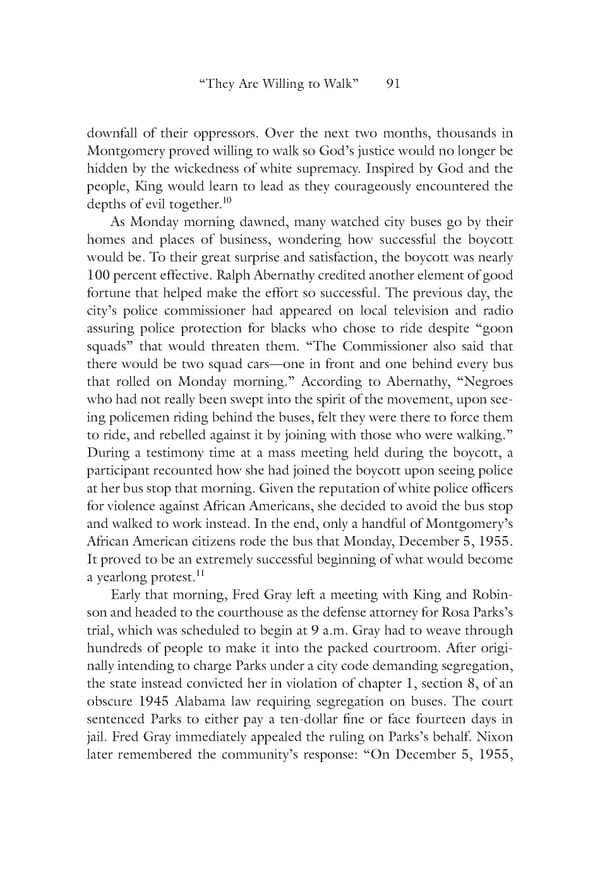“They Are Willing to Walk” 91 downfall of their oppressors. Over the next two months, thousands in Montgomery proved willing to walk so God’s justice would no longer be hidden by the wickedness of white supremacy. Inspired by God and the people, King would learn to lead as they courageously encountered the depths of evil together.10 As Monday morning dawned, many watched city buses go by their homes and places of business, wondering how successful the boycott would be. To their great surprise and satisfaction, the boycott was nearly 100 percent effective. Ralph Abernathy credited another element of good fortune that helped make the effort so successful. The previous day, the city’s police commissioner had appeared on local television and radio assuring police protection for blacks who chose to ride despite “goon squads” that would threaten them. “The Commissioner also said that there would be two squad cars—one in front and one behind every bus that rolled on Monday morning.” According to Abernathy, “Negroes who had not really been swept into the spirit of the movement, upon see- ing policemen riding behind the buses, felt they were there to force them to ride, and rebelled against it by joining with those who were walking.” During a testimony time at a mass meeting held during the boycott, a participant recounted how she had joined the boycott upon seeing police at her bus stop that morning. Given the reputation of white police officers for violence against African Americans, she decided to avoid the bus stop and walked to work instead. In the end, only a handful of Montgomery’s African American citizens rode the bus that Monday, December 5, 1955. It proved to be an extremely successful beginning of what would become 11 a yearlong protest. Early that morning, Fred Gray left a meeting with King and Robin- son and headed to the courthouse as the defense attorney for Rosa Parks’s trial, which was scheduled to begin at 9 a.m. Gray had to weave through hundreds of people to make it into the packed courtroom. After origi- nally intending to charge Parks under a city code demanding segregation, the state instead convicted her in violation of chapter 1, section 8, of an obscure 1945 Alabama law requiring segregation on buses. The court sentenced Parks to either pay a ten-dollar fine or face fourteen days in jail. Fred Gray immediately appealed the ruling on Parks’s behalf. Nixon later remembered the community’s response: “On December 5, 1955,
 Becoming King: Martin Luther King Jr. Page 111 Page 113
Becoming King: Martin Luther King Jr. Page 111 Page 113